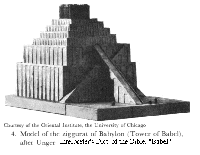
![]()
| Read Psalm 2. | |
| For your opening, thank God for all the technological advances that God has given us and pray that we use them wisely without turning to them as our gods. |
![]()
| Tell about an experience you had in a foreign country. | |
| What is the biggest misunderstanding you have had with someone because of a mis-hearing? | |
| What pieces of technology have become necessary for you? |
![]()
| The plain of Shinar mentioned in 11:2 probably refers to the basin of the Tigris and Euphrates Rivers in Babylon. Find Babylon on a map. Also find Ur and Haran which are mentioned in 11:31-32. | |||||||||||
Note the rough chiastic structure of
11:1-9
| |||||||||||
| We are probably to notice that the people use "bricks" instead of stone and "bitumen" instead of mortar. (Bitumen: The Hebrew word apparently refers to a gooey, slimy tar or asphalt. It was the stuff used to waterproof the basket which held the baby Moses in Exodus 2:3.) | |||||||||||
| 11.3, 4, 7 - Note the repeated refrain, "Come, let us..." It parallels the statement in 1.26! 11.4 - "Tower" probably refers to a ziggurat. (picture below) A famous ziggurat in antiquity was the one at Etemenanki which perhaps is behind the story here. | |||||||||||
| 11:8-9 - "Babel" is the Akkadian word Bab-ilani for "gate of God." There is a word play with the Hebrew words for "Babylon" and balal ("to confuse" in v.9). The English word "babble" comes from this story. | |||||||||||
| 11.10-26 - The descendants of Shem (son of Noah) which parallels the record in 10.21-30. | |||||||||||
| 11.27-30 - The descendants of Terah: Fill in the family tree recorded in 11:27-30 using the table provided. |

![]()
| Isaiah 14:1-27 | |
| Matthew 12:25 | |
| Luke 14:25-30 |
Other Internet Resources:
For another description and picture of the tower of Babel, check out http://website.lineone.net/~ssleightholm/dict/glossary/babel.htm
![]()
| Read Philippians 2:1-11. | |
| Confess your sins to God, especially the ways in which your pride has distracted you from serving God. | |
| What is one thing you will do to let others know about God? |
![]()